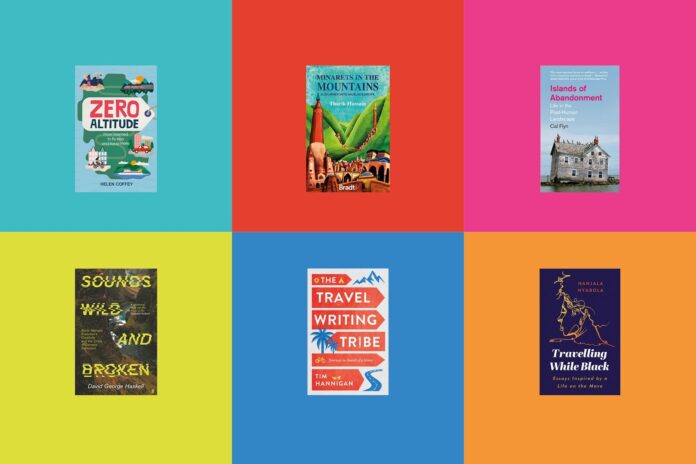Getting on a plane is an occupational hazard for the eco-conscious travel writer — the carbon-spouting elephant in the room addressed by Helen Coffey, who journeys as far as she can in the name of journalism, all without boarding a single flight. Rather than reducing her spectrum of experience and understanding of the world, Helen’s forays into parts unknown by train, car, boat and bike provide an exhilarating opportunity for adventure. Follow her as she meets climate experts and activists worldwide and take notes as she offers up practical tips on how to travel while keeping your feet firmly on the ground.
Richard Hammond, the founder of the Green Traveller website, was a pioneer of eco travel, championing sustainable-yet-exciting ways to explore the world. His new book examines how green travel has developed in recent decades and the crucial role it plays in the future of our planet. Packed with practical tips to inspire adventure, this is a handbook to help you navigate tricky terminology, cut through the greenwash and plan your next trip via reviews of everything from the best off-grid accommodation to campsites reachable by public transport and places where you can get involved in exciting citizen science projects.
Journeying from Monaco to Berkshire and far beyond, travel writer Tim Hannigan asks the big questions of the genre. What of travel writing’s uncomfortable colonial connections? Where does the frontier between fact and fiction lie? He digs around into the diaries of such canonical authors as Wilfred Thesiger and Patrick Leigh Fermor, discusses the time he enjoyed a beer and words of wisdom with the late Dervla Murphy and gets frank insight from celebrated scribes such as Colin Thubron, Samanth Subramanian, Kapka Kassabova and William Dalrymple. Despite some discomfiting discoveries, Hannigan’s love of travel writing endures.
David George Haskell is the author of 2021’s Thirteen Ways to Smell a Tree: Getting to know trees through the language of scent. His new book tunes into our sense of hearing with a globe-trotting journey through time. Exploring everything from rainforests that vibrate with insect sounds to swamps pulsing with frog calls, Haskell shines a light on evolution’s creative powers — how species learn to adapt through calls, song and sound. He takes us to threatened forests, noise-filled oceans and raucous city streets to show how vital sonic diversity is to the survival of our planet.
Shortlisted for a bevy of writing awards in the past year and winner of two Sunday Times writing prizes in 2022, including Young Writer of the Year, this travelogue asks us to explore a post-human world. Taking in such eerie spots as Chernobyl, the mining regions of Scotland and volcano-devasted Caribbean destinations, the Scottish Highlands-born writer explores the world’s abandoned places — ghost towns, exclusion zones and no-man’s lands — and paints an unflinchingly vivid, if ultimately optimistic, picture of what happens when nature is allowed to reclaim its place.
British identities and their place in our landscapes is another area ripe for exploration, as seen in such books as Jini Reddy’s feted, Wanderland. This 2021 release follows the journey made by Anita Sethi who, after being a victim of racial abuse, decides to hike across the Pennines – the ‘backbone of Britain’ – in a bid to reclaim the natural landscapes of the north and expel the crushing sense of claustrophobia, anxiety and panic attacks that the race hate induced. The resulting travelogue is a heartfelt examination of identity and how it shapes and is shaped by the landscape and cultures we move through.
An inspirational guide to travelling the globe sustainably, via trips that eschew winged transport in favour of such enticing experiences as backcountry bike rides, have-a-go sailing voyages, short jaunts on vintage railways and incredible intercontinental journeys. Packed with practical advice on everything from trip planning to budgeting, Gregg suggests new ways to explore well-known places, along with itineraries that include lesser-known destinations, activities and experiences, all encouraging us to make the journey an essential part of the adventure.
This book focuses on the best places to ride the rails via 30 themed routes where you can hop on and off at will. Via catchy itinerary categories, which include Alpine Ambles, Ski Escapes, Wine-Fuelled Wanders, and Chocolate, Cheese and Carb Delights, Wilson-Powell — founder of sustainable lifestyle magazine Pebble — explores everything from Europe’s top vineyards and the burgeoning crop of artisan food producers to the Alpine ski resorts striving to do things sustainably. Along the way, she finds plenty of places to take in the continent’s most impressive landscapes, either on foot or reclining in the comfort of a train carriage.
Nanjala Nyabola’s collection of probing essays ask some tough questions: what does it feel like to move through a world designed to limit and exclude you? How are Black lives impacted by the legacy of colonial cultures? What can travel tell us about our sense of self, of home, of belonging and identity? Her stories, drawn from travels as far afield as Nepal, Botswana, Sicily and Nairobi, offer some shocking and sometimes very humorous answers.
Nominated for several awards in the past two years, Hussain’s travelogue focuses on the Western Balkans, exploring the history and culture of Europe’s largest Indigenous Muslim population. Setting off from his home in London, the writer explores a region where Islam has shaped places and people for more than half a millennium, painting a picture of a hidden Europe, a place where marginalised cultures coexist. He encounters blonde-haired, blue-eyed Muslims, visits mystical Islamic mountain lodges and prays in mosques older than the Sistine Chapel.
Mike Unwin’s avian tour sheds light on our relationship with the natural world, revealing just how much our feathered friends mean to us, inspiring myth, national pride and even scientific discoveries. The book gives a platform to every bird with a story to tell, from the sociable weaver bird, which builds multi-nest ‘apartment blocks’ in Namibia to the bar-headed goose of China, which takes on a twice-yearly trans-Himalayan journey at an extreme altitude. Accompanied by exquisite illustrations, these pages make for some beautiful armchair nature travel.
Saladino spans the globe, uncovering the hidden stories of the food we eat — notably those foods we’re at risk of losing entirely. From a tiny crimson pear in the West of England to fermented lamb dish that’s delicacy in the Faroe Islands, and exploding corn in Mexico, thousands of our most interesting foods risk being lost amid a deluge of readily available, mass-produced alternatives. Ironically, it’s this threatened culinary heritage that may well hold the key to our culinary futures. Celebrating crop biodiversity, Saladino meets the pioneering farmers, scientists, cooks, food producers and Indigenous communities who are both preserving food traditions and fighting for change.
Follow us on social media
Facebook | Twitter | Instagram













